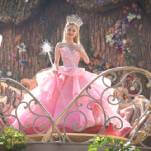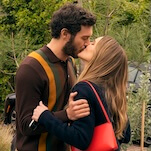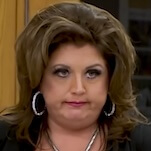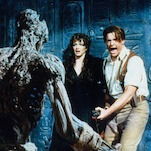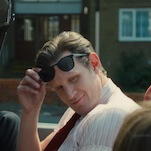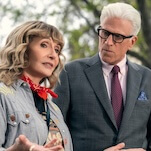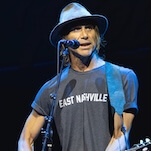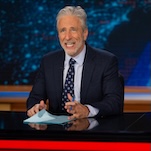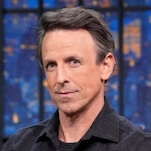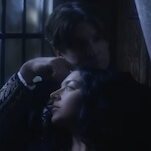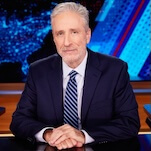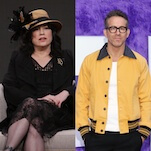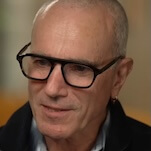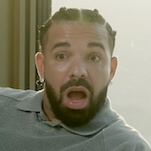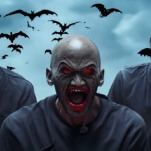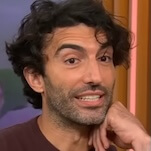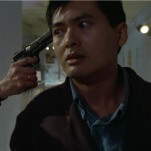This is a very personal project, to the extent that it sometimes resembles a trip to Marilyn’s therapeutic couch for both Klausner and Eichner. Many plot points in the series, such as Julie’s experiences with blowback from controversial tweets, were apparently inspired by true events. This approach is the familiar brand of introspective quasi-fiction especially popular in comedy today, where artists deconstruct and critique their own lives in search of laughs and drama that might resonate. Difficult People takes self-awareness to absurd lengths. The very existence of the characters Denise and Matthew is partly due to the show’s need to undercut Billy’s bad behavior. Billy makes anti-Semitic and homophobic jokes not just for the sake of shock, but in order to establish the character as such a bitter person that he even stoops to attacking the very groups with which he identifies. The show is so self-aware, even Julie and Billy are aware of their coping mechanisms—namely, pop culture minutiae and social media—but they just refuse to change. In a final reiteration of the show’s take on these characters, Julie’s bad behavior is punished in the end.
When it comes to identity, Billy is more interested in his role as an artist than his role as a gay man or a Jewish man, and the show focuses tightly on these two comedians’ specific perspectives. Many artists pride themselves on being open-minded people; meanwhile, these characters are anything but. They are the types of people who value bluntness if it helps them get their way, get attention, or get a laugh. Honesty isn’t a flaw in and of itself, but Julie and Billy take this virtue to an extreme, valuing it above common human decency. Causing a scene in a theater in defense of their right to be obnoxious isn’t a solitary stand being taken—it’s a way of life. The show is about people who form bubbles around themselves, enabling one another to judge anyone who isn’t just like them, behavior hardly reserved for artists but familiar to Klausner. To add to the show’s relevancy, Julie’s attitude towards social media and comedy in general—that her priority when tweeting is whether or not a joke gets a laugh, regardless of whom it might offend—speaks to the current dialogue concerning the ethics of comedy.
The way the show uses social media as a narrative tool is especially impressive in an age where every joke about Twitter and Facebook has been stripped for parts. It’s also impressive how Julie’s unhealthy attachment to social media is systematically developed in order to establish the weapon that her newfound enemy eventually uses to destroy her. People develop self-destructive coping mechanisms to deal with pain, such as professional disappointments and family tensions. Julie and Billy use Twitter and immerse themselves in pop culture because those are strategies that could be advantageous to aspiring actors, but they also take it too far, losing themselves in the escapism. It’s no coincidence that Billy and Julie eschew Marilyn’s therapy in favor of their own brand of self-medication.
A lot of the show’s humor may have an edge to it, but warmth remains due to the leads’ central friendship. Even when they’re being awful, the connection between Julie and Billy is well-established, from the way they can talk in total unison while maintaining separate trains of thought to the way they derail every conversation with others in favor of their own inside jokes. In some ways, this is a toxic friendship. Difficult People asks fun questions like, “Could there be a downside to finding your platonic soulmate?” Many shows focused on insular friendships feature at least one episode during their run where outsiders react to the group’s crazy dynamic; Difficult People is basically an entire show devoted to that premise. Will and Grace, which many might consider one of Difficult People’s spiritual predecessors, also went to some lengths to delve into the dark turns that some friendships can take, where compatibility turns into co-dependence and enabling. Will and Grace was always more concerned with the way the protagonists’ friendship affected their love lives, however, and Difficult People thankfully takes its story in a different direction.
Television shows about difficult people can be a tough sell. The idea is that viewers will tune in to series featuring unlikable characters if they recognize some universal truths in the story and find enjoyment in the worlds being sold to them. Difficult People is interested in universal issues presented in a very specific package. Network television tends to skew towards the broad in order to track the largest audience, while cable is more willing to chase after niche subsets of viewers. With Difficult People, Hulu is taking a chance by continuing the cable tradition of embracing the risk of alienating a broad swath of its potential audience. Klausner, Eichner, producer Amy Poehler, many of their fans, and Hulu are interested in this specific perspective—as for the general public, only time will tell.
Stray observations
- “God, I’m so funny when I write mean things about TV shows. How come no one’s hired me to write for one?” “Because our lives are garbage and it’s the world’s fault.” That stings in the best way. Thanks, show.
- “Nobody wants to see an understudy. Understudy is like a fancy word for disappointment.”
- “Honey, do you know this Lena Dunham? Apparently she’s doing great and she’s younger than you. She has tattoos.”
- “Don’t you look pretty when you smile?” I’m glad that the world has recently acknowledged that comments like these are women’s worst nightmare.
- “Do you want to take a walk around the block? We can talk about Susan Sarandon.” “Beats taking deep breaths.”
- “Sometimes when I hear you speak, I think I should join the Westboro Baptist Church.” Is this a case of internalized homosexuality? Ladies and gentlemen, start your thinkpieces.
- Yay for PBS jokes. Take that, public broadcasting!

